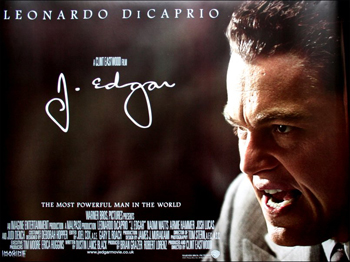J. Edgar ***
 This is yet another film full of promise about another enigmatic icon, J. Edgar Hoover, the man who created the FBI, and one of the most complicated and feared characters to walk the US corridors of power. The parallels between this film and the recently released The Iron Lady, starring Meryl Streep, are apparent: both films allow the controversial protagonist the chance to tell their side of events, but both brush over further enlightening those not in the know as to the seismic impetus their individual reigns had on politics and power.
This is yet another film full of promise about another enigmatic icon, J. Edgar Hoover, the man who created the FBI, and one of the most complicated and feared characters to walk the US corridors of power. The parallels between this film and the recently released The Iron Lady, starring Meryl Streep, are apparent: both films allow the controversial protagonist the chance to tell their side of events, but both brush over further enlightening those not in the know as to the seismic impetus their individual reigns had on politics and power.
The story explores the public and private life of J. Edgar (Leonardo DiCaprio), and his rocky rise to infamy as the first Director of the Federal Bureau of Investigation (FBI) of the United States, as well as the man credited with modernising police technology with finger printing and forensic evidence. It also touches on Hoover’s close relationships with his mother, Anna (Judi Dench), his colleague and companion, Clyde Tolson (Armie Hammer) and his loyal personal assistant, Helen Gandy (Naomi Watts).
It seems awards season encourages such films that calculatingly rely on a central performance to get the public intrigued and manoeuvre them to the top of the box office. Of course, this is no criticism directed at the actors themselves, with DiCaprio as J. Edgar giving the expected masterly and award-worthy performance, ensuring director Clint Eastwood’s latest biopic never completely runs out of puff. Indeed, watching DiCaprio age gracefully – unlike the farcical aging effects on Hammer as Tolson, who looks like a peeling extra from a horror film – is absolutely fascinating as the versatile actor moves between embodying the younger and older versions of J. Edgar very comfortably.
The rest of the film, though, feels cumbersome, overly long and too Hoover-biased to ever delve deeper into why J. Edgar really riled ex-Presidents, short of being a stick-in-the-mud and stubborn as a mule until his grating voice was heard. The only unpleasantness about the character established from the film was his childish fashion of making recordings of people in power to use at a later date – sounds like an early version of phone tapping, so feels very relevant today.
There is one memorable and well-acted scene involving Hoover and Tolson fighting on a weekend break in a hotel room that is the only glimmer of passion Eastwood manages to inject; it’s also the only evidence of Oscar-winning Milk screenwriter Dustin Lance Black at work, trying to ignite an emotional core to this story by tapping into the closeted homosexual element that threatens to expose a public figure. However gifted DiCaprio is at capturing the inner workings of the colourful characters he plays, he is only as good as the material at hand, and sadly, Eastwood’s story often runs out of energy and excitement when the pace needs intensifying – much like his steadily wearier-growing elder protagonist.
Eastwood misses a trick in investigating the more compelling psychological influence J. Edgar Hoover had over his counterparts, and what inner personal battles really raged beneath the hardened exterior – even with a dress-up scene involving a grieving J. Edgar to hand at the end. Unfortunately, most will come out of viewing this film none the wiser about Hoover, but their faith in another DiCaprio triumph will be further endorsed.
3/5 stars
By @FilmGazer